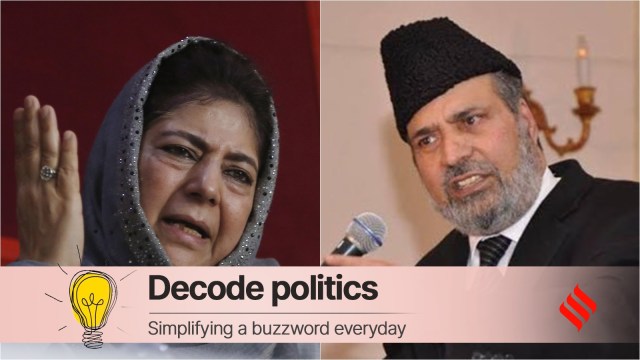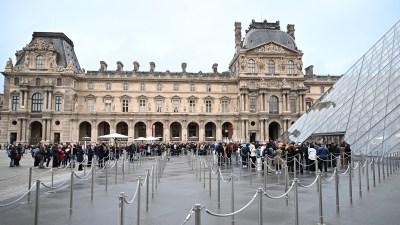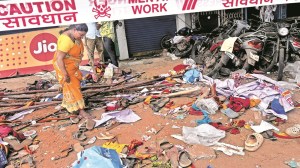Baig rejoined the party at a function organised in Anantnag district to commemorate the eighth death anniversary of party founder Mufti Mohammad Sayeed. He also offered fatiha (special prayers) at the mausoleum of Sayeed at Bijbhera in the south Kashmir district.

Some in the PDP, however, continue to remain critical of his politics and his stand against Article 370. His critics see his politics at odds with party president Mehbooba Mufti, particularly over the abrogation of Article 370. Others see Baig’s return as a strategic move on the PDP’s part to put up a united front.
Story continues below this ad
What are Baig’s views and why did he leave the party? We trace the journey.
Why did Baig resign?
The 77-year-old leader had been associated with the PDP since 1998. On August 4, 2019, a day before the Centre moved to scrap Article 370, several J&K parties, including the PDP and Congress, met at the residence of National Conference (NC) president Farooq Abdullah at Gupkar Road in Srinagar. They issued a joint statement on defending Article 370.
A year after the abrogation of Article 370, leaders of these parties again met to uphold the Gupkar Declaration, which said the parties would strive for the restoration of Articles 370 and 35.
Subsequently, this grouping of seven parties took a formal shape as the People’s Alliance for Gupkar Declaration (PAGD) in October 2020, resolving to contest the District Development Council (DDC) elections together.
Story continues below this ad
The seat-sharing talks created issues within the party. Baig was said to be upset over seat distribution, especially in north Kashmir. Sources said Baig’s wife Safeena wanted to contest from Wagoora DDC seat as a PDP candidate. The seat, however, went to the NC, leaving Baigs unhappy. Safeena eventually contested as an independent, won the election, and was elected as the chairperson of the Baramulla DDC. In March 2021, Baig formally joined Sajad Lone’s Peoples Conference, only to be expelled a few months later.
Why did some in PDP oppose Baig’s return?
As news of Baig’s return emerged over the weekend, it caused disagreements in the PDP ranks. Baig was the first political leader from Kashmir to call Article 370 a legislation “of history”, being vocal about his opposition to it. This is contrary to Mufti’s position vowing to fight even after the Supreme Court verdict validated the revocation.
Often called “New Delhi’s man in Kashmir”, Baig was awarded the Padma Bhushan in January 2020, barely six months after the Centre revoked the special status. The award was accepted by Baig even when most of his party leadership including Mufti were behind bars and booked under the Public Safety Act. This move created resentment within the party.
What are party leader saying?
“His (Baig’s) politics has always been opportunistic,” said a PDP leader from South Kashmir. The leader alleged Baig betrayed Mufti Mohammad Sayeed, the CM when he was the Deputy CM, and became “close to (Ghulam Nabi) Azad”. Baig’s acceptance of the Padma Bhushan award was akin to “rubbing salts in the wounds of the people of Jammu and Kashmir”, the PDP functionary said.
Story continues below this ad
A young PDP leader from North Kashmir said, “He (Baig) enjoyed all the perks when the party was in power. He was the party patron, deputy CM and MP.”
He added, “But when the party was out of power and being associated with the party came with its own perils (post the abrogation), he left the boat to sink. If he gets back in the party, what face would the leaders show to the younger leaders who stood by the party despite pressure? What about those who put their political careers at risk by joining the party when everybody was leaving it?”
Many PDP functionaries think that Baig’s politics “will hurt the party’s prospects”.
Another young leader said, “After the coalition government with BJP (in 2018), our party’s popularity was at its lowest. We were paying for our mistake of reposing trust on the BJP. Then after the abrogation, there was an assault on our party and almost the entire leadership left, willingly or unwillingly, for greener pastures.”
Story continues below this ad
He added that the PDP could “pick up the threads” by reaching out to the people and raising their concerns in the post-abrogation landscape. “Baig sahib received the Padma award that is seen as celebrating the disempowerment of people. How can the two meet again?”
What are the veteran leader’s supporters saying?
Those who supported Baig’s return to the party argue that “it is for the greater good of the people of Jammu and Kashmir”.
A PDP leader said, “We are talking about unity. We have extended our hand of friendship to NC, our rival. When we talk of larger unity, how can we justify the mini-factions in the party?”
Another functionary said Baig’s statements about the revocation of Article 370 do not amount to a lot after his defence of the special status in the Supreme Court. Baig is an advocate and spoke on behalf of the petitioners challenging Article 370 as part of the hearings on the case. “What he said in 2020 about Article 370 can be seen as his pragmatic position but what he said in the SC can be considered his official position,” said the leader.

































